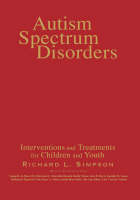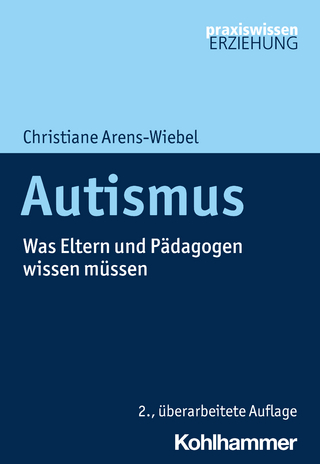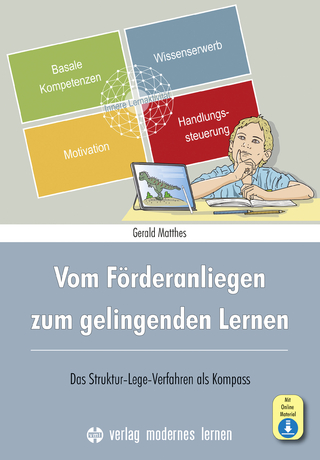
Autism Spectrum Disorders
Corwin Press Inc (Verlag)
978-1-4129-0602-9 (ISBN)
- Titel ist leider vergriffen;
keine Neuauflage - Artikel merken
With Contributions From: Sonja R. de Boer-Ott, Deborah E. Griswold, Brenda Smith Myles, Sara E. Byrd, Jennifer B. Ganz, Katherine Tapscott Cook, Kaye L. Otten, Josefa Ben-Arich, Sue Ann Kline, and Lisa Garriott Adams
How can you best help a child with autism reach their full potential?
Autism Spectrum Disorders (ASD) present a perplexing challenge for parents and school professionals. Literally dozens of interventions and treatments are available, so how does one know which intervention strategy works best for any given child or situation? This essential resource was developed to respond directly to the extraordinary difficulty school professionals and families face in selecting and applying appropriate, effective interventions and treatments for the children in their care.
The information is presented in a straightforward and simple format, practical for finding clear answers to complex questions. For easy access, the book is organized into the following five intervention categories-Interpersonal Relationships, Skill-Based Treatment Programs, Cognitive Methods, Physiological/Biological/Neurological Approaches, and Other Treatments and Interventions. Each category contains several detailed reviews, including:
A description of the intervention or treatment
Reported benefits and effects associated with its use
A synthesis of how the outcomes relate to individuals with ASD
A discussion of who is best qualified to implement it, including when and where
Potential costs and risks
Comprehensive in scope, this resource briefly evaluates over 40 commonly used interventions and treatments for individuals with ASD, as well as detailed evaluations of their utility and efficiency. It will assist readers in critically evaluating and choosing those methods that have the highest probability of yielding benefits for this special population.
Richard L. Simpson was Professor Emeritus at the University of Kansas. He was a member of the Department of Special Education faculty for over 40 years. While at the University of Kansas he directed numerous University of Kansas and University of Kansas Medical Center demonstration programs for students with autism spectrum disorders and other disabilities and coordinated a variety of federal grant programs related to students with autism spectrum disorders and other disabilities. He also worked as a special education teacher, school psychologist and coordinator of a community mental health outreach program. Rich authored numerous books, articles, and texts on a variety of topics connected to students with disabilities. Rich was the former senior editor of the professional journal Focus on Autism and Other Developmental Disabilities. His awards include the Council for Exceptional Children Research Award, Midwest Symposium for Leadership in Behavior Disorders Leadership Award, Autism Society of Kansas Leadership Award, and numerous University of Kansas awards and distinguished roles, including the Gene A. Budig Endowed Teaching Professorship of Special Education. Sonja R. de Boer is a Board Certified Behavior Analyst-Doctoral (BCBA-D) and obtained her Ph.D. in special education and psychology and research in education at the University of Kansas, with an emphasis on early intervention for children with Autism Spectrum Disorders (ASD). Richard Simpson was her advisor through her doctorate program. She has approximately 30 years of experience working in early childhood special education, early intervention services, Applied Behavior Analysis (ABA), with students with disabilities, and specifically children with ASD. For children with ASD, she has designed and supervised in-home intervention programs (ages 0-10), preschool programs (ages 3-6; both intensive ABA and inclusive preschools), as well as elementary school educational and behavioral programs (ages 5-12). For more than half of her career, she has focused on serving students with ASD and their families and educators in rural communities. She is currently a faculty member for Tufts University Medical Center in Child Psychiatry and provides training and consultation around the nation regarding interventions for children with ASD. Besides the United States, she has worked with professionals, universities, non-profit organizations and families with children with ASD and other disabilities in Australia, New Zealand, Ireland, Russia, Nigeria, China, Chile, Abu Dhabi and Dubai. She is the author of the book Successful Inclusion Practices for Children with Autism: Creating a Complete, Effective, ASD Inclusion Program (currently being revised and updated for publication); Discrete Trial Training, 2nd edition (part of the How To Series on Autism Spectrum Disorders); and is one of the original co-authors of the first edition of Autism Spectrum Disorders: Interventions and Treatments for Children and Youth written with Richard Simpson in 2005. Deborah E. Griswold is Project Coordinator in the Department of Special Education at the University of Kansas. Her interests and research are in autism spectrum disorders, emotional and behavior disorders, and disability and the link to delinquency and adult incarceration. She received her doctorate from the University of Kansas. Brenda Smith Myles is Associate Professor in the Department of Special Education at the University of Kansas, where she codirects a graduate program in Asperger syndrome and autism. She has written numerous articles and books, including Asperger Syndrome and Difficult Moments: Practical Solutions for Tantrums, Rage, and Meltdowns and Asperger Syndrome and Adolescence: Practical Solutions for School Success, the winner of the Autism Society of America’s outstanding literary work in 2002. Dr. Myles is on the executive boards of several organizations, including the Organization for Autism Research and MAAP Services, Inc. Jennifer B. Ganz is Assistant Professor of Special Education at the University of Texas at San Antonio. Dr. Ganz previously worked as a general and special education teacher and an educational consultant. Her research interests include strategies to improve social and communication skills in individuals with autism spectrum disorders. Katherine Tapscott Cook is an assistant professor at Missouri Western State College in special education. She received her PhD in special education with an amphasis in autism, Asperger syndrome and behavior disorders from the University of Kansas. Dr Cook′s principle research interests in the area of autism spectrum disorders include sensory integration and social skills instruction. She is a co-author of Asperger Syndrome and Sensory Issues. Kaye Otten has a doctorate from The University of Kansas in special education with an emphasis in emotional, behavioral, and autism spectrum disorders and is a board certified behavior analyst with Summit Behavioral Services specializing in school based services. She provides collaborative coaching to school districts in developing evidence based multi-tiered systems of behavioral support and serves as adjunct faculty with The Mandt System, an international leader in crisis prevention and intervention. Kaye has over thirty years of experience in public and private schools as a general and special educator and behavioral consultant and has experience working with all ages, ability levels, and disability categories. She is the co-author of the book How to Reach and Teach Children with Challenging Behavior: Practical Ready-To-Use Strategies that Work and the online professional development courses Managing Challenging Behavior: Part 1-Antecedent Strategies and Part 2-Consequence Strategies provided by Exceptional Child of Vector Solutions. Josefa Ben-Arieh earned an undergraduate degree in English language and linguistics from Ben-Gurion University, Israel, in 1978. In 1998 she earned an MSEd from the University of Kansas in special education and a PhD in 2003. Her area of expertise is autism and behavior disorders. Sue Ann Kline is Executive Director for the Autism Asperger Resource Center at the University of Kansas Medical Center. She received her doc-torate in special education from the University of Kansas. For more than ten years, she taught students with learning disabilities and severe emo-tional and behavior disorders in both rural and suburban areas, and she has experience teaching at the college and university level. Dr. Kline has worked as a special education consultant across the State of Kansas. She has served as a consultant for many public and private schools and agencies in both Missouri and Kansas. In addition, she has authored and coauthored professional articles, manuscripts, interviews, and book chapters. Kline has conducted presentations at more than 75 professional state, regional, and national conferences, and conducted more than 200 in-service courses and workshops on various topics related to children and youth who have special needs. Lisa Garriott Adams is Clinical Director of the Autism Asperger Resource Center in Kansas City. Dr. Adams received her doctorate in special educa-tion from the University of Kansas in 2003. Specialty/interest areas include increasing the play and socialization skills of children and youth with autism spectrum disorders and emotional behavioral disorders.
Acknowledgments
Introduction
About the Authors
1. Interpersonal Relationship Interventions and Treatments
Holding Therapy
Gentle Teaching
Option Method (Son-Rise Program)
Developmental, Individual-Difference Relationship-Based Model (Floor Time)
Play-Oriented Strategies
Pet/Animal Therapy
Rationship Development Intervention (RDI)
2. Skill-Based Interventions and Treatments
Picture Exchange Communication System (PECS)
Incidental Teaching
Facilitated Communication
Augmentative and Alternative Communication
Assistive Technology
van Dijk Curricular Approach
Applied Behavior Analysis (ABA)
Discrete Trial Teaching (DTT)
Joint Action Routines (JARs)
Fast ForWord®
Pivotal Response Training
Structured Teaching (TEACCH)
3. Cognitive Interventions
Cognitive Behavioral Modification
Cognitive Learning Strategies
Cognitive Scripts
Social Stories
Power Cards
Cartooning
Social Decision-Making Strategies
Learning Experiences: An Alternative Program for Preschoolers and
Parents (LEAP)
4. Physiological/Biological/Neurological Treatments and Interventions
Scotopic Sensitivity Syndrome: Irlen Lenses
Sensory Integration
Auditory Integration Training
Mercury: Vaccination and Autism
Candida: Autism Connection
Gluten-Casein Intolerance
Megavitamin Therapy
Feingold Diet, Herb, Mineral and Other Supplements
Pharmacology
5. Other Treatments and Interventions
Art Therapy
Music Therapy
Index
| Erscheint lt. Verlag | 20.7.2004 |
|---|---|
| Verlagsort | Thousand Oaks |
| Sprache | englisch |
| Maße | 177 x 254 mm |
| Gewicht | 630 g |
| Themenwelt | Sozialwissenschaften ► Pädagogik ► Sonder-, Heil- und Förderpädagogik |
| ISBN-10 | 1-4129-0602-4 / 1412906024 |
| ISBN-13 | 978-1-4129-0602-9 / 9781412906029 |
| Zustand | Neuware |
| Haben Sie eine Frage zum Produkt? |
aus dem Bereich


